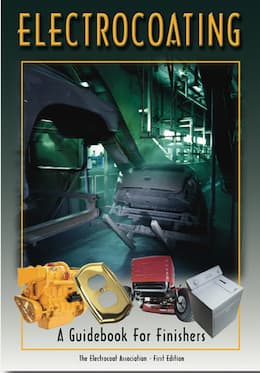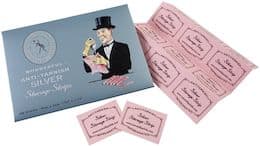
Curated with aloha by
Ted Mooney, P.E. RET

The authoritative public forum
for Metal Finishing 1989-2025

-----
E-coating for silver jewelry
Q. What compounds should be used for e-coating for silver jewelry? Our items are coated with silver and do not tarnish for about 12 months. Is this considered to be e-coating? Or should the coating be an organic lacquer for our silver jewelry items to be considered as e-coated in the U.S.?
Victor SazloINDUSTRIALIST - Milano, Italy
2007
by Electrocoat Association

on eBay or
AbeBooks
or Amazon
(affil links)
A. Silver plated items are generally coated with clear polyurethane electrophoretic lacquer which gives it very good tarnish resistance. Theoretically silver plating does qualify to be called e-coating but in actual practice e-coat refers to electrophoretic coating. Try www.electrocoat.org for complete information of E-coating.
Gurvin SinghMohali, Punjab, India
2007
Q. E-COATING over sterling silver: is there a standard? Or when you are requested to E-coat silver jewelry you can use any method you want, like electro coating with 100% silver as a protection layer?
Yossi Rozenfelerjewelry manufacturer - Rosh Haayin, Israel
2004
A. First a clarification. Theoretically, E-coat could be any electrolytic coating process. However, in general use, at least in this part of the world, E-coat is usually used for the Electrophoretic coating. And you do go on to mention Silver plating. Electrophoretic clear lacquer coating does give excellent tarnish protection to Silver. Electrophoretic clear lacquer coatings have their standard specifications. I hope this helps.
Regards,
Mohali, Punjab, India
2004
A. Hi Victor; hi Yossi. I am sensing that you are confused what e-coating is about. As correct and informative as Gurvin's answers are, you may still be confused. Yes, sure, Gurvin covers all the bases when he says that e-coat could theoretically mean any electrolytic coating process. But to people in the business like you, Gurvin and I, "e-coating" or "electrocoating" always has the more specific meaning of electrolytically applying an organic topcoat with properties fairly similar to paint.
People might well call silver plating "electroplating", but they would never call it "electrocoating". Rather, people like you might do silver electroplating of jewelry and, upon realizing that it tarnishes, might look for a way of deterring the tarnishing. One of the ways of deterring tarnishing would be to apply a clear coat to seal the silver surface away from the air; and one of the excellent ways of applying a very thin clearcoat with excellent properties is electrocoating. In electrocoating the object is immersed in a tank with charged polymer ions floating in the solution. Electricity is applied to the part, and this oxidizes or reduces those ions to convert them to a solid organic coating on the parts. Good luck.
Regards,

Ted Mooney, P.E.
Striving to live Aloha
finishing.com - Pine Beach, New Jersey
June 2013
Q. E-coating oxidized silver? I am very interested in getting an answer to the problem because it is causing me a lot of trouble with my clients.
The competition says that they can e-coat silver that has been oxidized with potassium sulphate with no problem -- but somehow we cannot do it.
Can you help me address this issue?
plating shop employee - Bolivia
2007
Q. I have some E-coat problems. So I would like to know how to check E-coat. Is complete coverage enough ?
Wassana S.Operations Manager - Illinois
June 29, 2010
RFQ: I am looking for a small e-coat set up for a costume jewelry model shop.
The e-coat is to cover silver plated items to prevent tarnishing. Maintaining the color integrity of the silver plate is critical to the end customer.
Is there a way to do e-coat on a very small scale?
- Yonkers, New York
2006
Ed. note: This RFQ is outdated, but technical replies are welcome, and readers are encouraged to post their own RFQs. But no public commercial suggestions please ( huh? why?).
A. Yes, it can most certainly be done on a very small scale. in fact, a small bath of 20 to 40 liters will be more than sufficient. Being in the US you can get a small laboratory size UF which can be integrated for lacquer recovery.
adv.
You will get a link from our company web site. For more specific guidance you can write to us.
Best of luck.
Gurvin SinghMohali, Punjab, India
2006
Q. I am a chemist of electroplating company of fashion jewelry. We plate Gold and Rhodium fashion jewelries. Our client specification for our plated jewelry must be 6 month warranty without tarnishing or if possible small percentage of returns. Our problem is, our plated items tarnished within only 1 month . Please can you give us any way to prevent tarnishing easily or please give us any supplier to supply us anti-tarnish E-coat just to protect our items from tarnishing within 6 months warranty.Your support will be great help in our company.
Constantino CusipagChemist - Quezon City, Philippines
2007
A. Electrophoretic clear lacquer is used extensively for exactly this purpose.
You can go ahead with it and expect complete resolution to this particular problem. Please ensure that the quality of electrocoating lacquer is up to the mark and it does not add to your problems.
Best of luck.
Mohali, Punjab, India
2007
Q. I use silver, copper and brass for jewelry making. Does e-coating have better adhesion on any one of them?
Sally Richards- Ludington, Michigan usa
September 17, 2012
Q. RESPECTED SIR,
WE WOULD LIKE TO KNOW HOW E-COATING CAN BE DONE ON SILVER AND GOLD JEWELLERY.
WHAT ARE THE BENEFITS OF THE SAME. ?
- JAIPUR, RAJASTHAN, India
February 4, 2009
A. The benefit is that the silver will not tarnish and flash gold (is it flash?) will not rub off.
E-coat is the best top coat for this application.
Find a supplier, there are many.

Sara Michaeli
Tel-Aviv-Yafo, Israel
March 3, 2009
A. Do lacquer over base coat (any colour you want). if you are doing business in bulk you could install an E Coat line for lacquer.
THANKS
- DELHI, India
March 22, 2009
Lacquer for silver castings
Q. Hi sir. I am Karthick from Chennai. Ii have started a new casting unit. I should know about the difference between e-coating and lacquer coating. Please give me an idea. I need the chemical, where would I get the chemical? And one more question, can I can use the lacquer for silver rings? Thank you sir I am waiting for your reply.
- Chennai Tamil Nadu, India
June 12, 2016
A. Hi Karthick. As you can see, this thread has been running for 12 years now, and sometimes it takes a very long time for anyone to improve the answers. Hopefully you'll get a good answer, but please don't wait for it :-)
Lacquer probably refers to a nitrocellulose or another coating which dries, i.e., the solvent evaporates, leaving the solids behind as a lacquer coating. But "drying" is not the only way a clear liquid coating material can be converted to a solid. They can cure as reactions between two components, as in epoxy coating or two-component automotive clearcoats; they can be radiation (UV) cured like women's fingernail lacquers applied by manicure shops; or electricity can convert molecules of polyurethane or other plastic to a solid while the parts are immersed in a solution, as in cathodic electrocoating.
Yes, these coatings can be applied to silver as well as to gold, but things gets a bit confused when we mix silver castings into this discussion because the reason for clearcoating thin gold plating (preventing wear) is rather different than the reason for clearcoating sterling silver objects (preventing tarnish); plus, while lacquering or clearcoating of some sort may be the best idea for gold, rhodium plating might be a better idea for the silver.
Regards,

Ted Mooney, P.E. RET
Striving to live Aloha
finishing.com - Pine Beach, New Jersey
Q. Hello, we are currently developing a new jewellery production in brass with silver plating and we don't know if 4 microns of silver is better than 2 microns with e-coating.
Also we are trying to find out what is the best option for under coating apart from nickel as we want our jewellery to be nickel free.
Our ideal coating should last about two years also for rings.
Any suggestion? We read that bronze is a good undercoating to keep silver not tarnish with brass, is it correct?
Thank you very much
product designer - Toscana, Italy
February 27, 2017
Ed. note: This RFQ is outdated, but technical replies are welcome, and readers are encouraged to post their own RFQs. But no public commercial suggestions please ( huh? why?).
Q, A, or Comment on THIS thread -or- Start a NEW Thread
